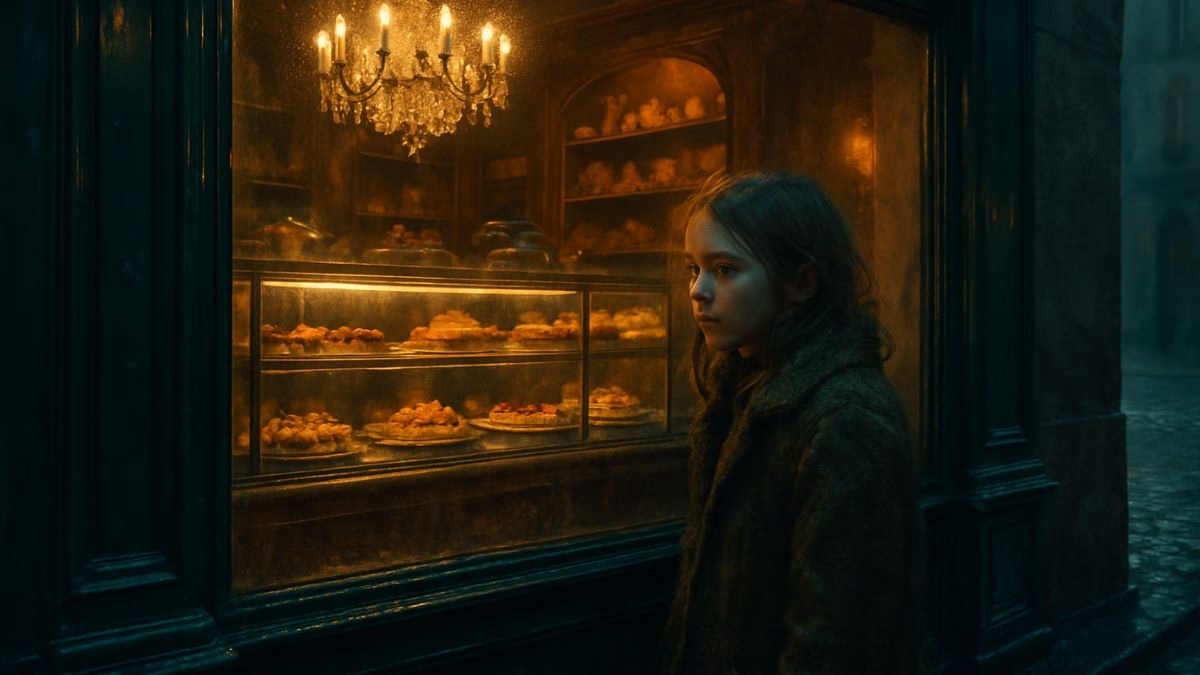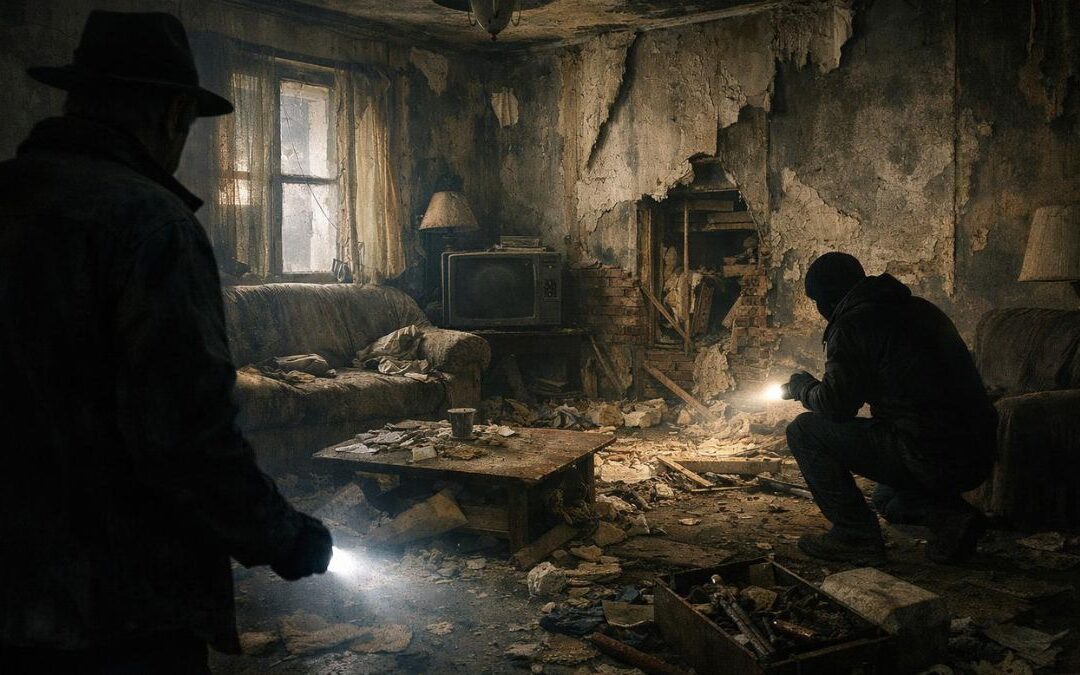The winter in Paris was not the romantic flurry of white snowflakes often painted on postcards sold along the Seine. For Chloé, winter was a damp, gray weight that settled into the marrow of her bones. It was the stinging slap of wind whipping around the corner of Rue des Rosiers and the way the cold pavement seemed to chew through the thin rubber soles of her sneakers.
Chloé was ten years old, old enough to know that the City of Lights shone differently depending on which side of the door you were standing on.
Tonight, the air smelled of exhaust fumes and roasted chestnuts, a peculiar mix that defined the festive season in the 4th arrondissement. She tightened her scarf—a scratchy, synthetic wool thing she had fished out of the communal bin at the shelter—and tucked her chin toward her chest. She wasn’t supposed to be out this late. The shelter doors locked at nine, and the matron, a woman who smelled perpetually of bleach and boiled cabbage, did not look kindly on stragglers.
But the shelter was loud tonight. Arguments over charging cables and the crying of a new baby in the bunk below hers had driven Chloé out into the cold. She needed a moment of quiet. She needed to pretend, just for an hour, that she was simply a girl taking a walk, not a number on a waiting list for permanent housing.
She found herself, as she often did, standing in front of Maison Lefèvre.
The pâtisserie was a jewel box of a shop. The window frames were painted a deep, glossy emerald, and the glass was always polished to an invisible clarity. Inside, the world was golden. Amber light spilled from wrought-iron chandeliers, bathing the room in a warmth that looked as thick and sweet as honey.
Chloé pressed her hands into her pockets, careful not to touch the glass. She knew the rules of the street: don’t loiter, don’t touch, don’t look like a problem. So she stood a foot away, watching the theater of the bakery unfolding.
It was Christmas Eve, and the shop was bustling. A woman in a camel-hair coat was pointing at a Bûche de Noël—a Yule log cake rolled in chocolate ganache and decorated with meringue mushrooms. The baker, a tall man with flour dusted into his eyebrows, nodded patiently as he boxed it up with a ribbon.
But it wasn’t the chocolate that held Chloé’s attention. It was the smell that drifted out every time the door chimed open.
It was the scent of pain d’épices—spiced bread. It smelled of cinnamon, star anise, nutmeg, and burnt sugar. It was a smell that didn’t just trigger hunger; it triggered a memory of a life before the eviction, before the suitcases, before the cold. It smelled like a home.
Chloé closed her eyes for a second, inhaling sharply through her nose, letting the spice fill her lungs. It was a trick she had learned: if you breathed it in deep enough, your stomach would briefly forget it was empty.
When she opened her eyes, she realized she had been spotted.
Inside the shop, a boy about her age was wiping down the counter. He was the baker’s son, Luc. She had seen him before, usually hauling sacks of flour or looking bored behind the register. But tonight, he wasn’t looking at the register. He was looking right at her.
Chloé flinched. Her instinct was to run. She knew what came next: a shooing motion, a frown, or worse, the pitying look that felt heavier than the cold. She stepped back, ready to disappear into the shadows of the alleyway.
But Luc didn’t shoo her away. He turned his head and said something to a woman behind the counter—his mother, Madame Lefèvre. The woman looked up from the register. She adjusted her glasses, her gaze piercing through the glass and the winter gloom to land on Chloé.
Chloé’s heart hammered against her ribs. Run, her mind whispered.
Before she could move, the heavy wooden door of the shop clicked and swung open. A wave of heat, rich with butter and vanilla, rolled out onto the sidewalk, enveloping Chloé in a momentary embrace.
“Mademoiselle?”
It was Madame Lefèvre. She wasn’t holding a broom to sweep Chloé away. She was holding the door.
“It is far too cold to be standing on the cobbles tonight,” the woman said. Her voice was brisk but not unkind. “Come inside. You are letting the heat out.”
Chloé hesitated. She looked down at her sneakers, wet with slush, and then at the pristine checkerboard tiles of the shop floor. “I don’t have any money,” Chloé whispered, the admission burning her throat.
“I didn’t ask for money,” Madame Lefèvre said. “I asked you to close the door. From the inside.”
Luc was watching her from the counter, a small, tentative smile on his face. Chloé took a breath, stepped over the threshold, and the door clicked shut behind her.
The silence of the shop was profound. The roar of the city traffic vanished, replaced by the soft hum of a refrigerator and the clinking of china. The warmth was immediate, rushing into her frozen cheeks, making them prickle and burn.
“Sit,” Madame Lefèvre commanded gently, pointing to a small, round marble table in the corner near the radiator.
Chloé sat. She sat on the edge of the velvet chair, terrified that the grime of the city clinging to her coat might stain the fabric. She kept her hands in her lap, making herself as small as possible. She expected, perhaps, a stale baguette to be handed to her—something from yesterday’s batch that couldn’t be sold. That was how charity usually worked: you got the leftovers, and you said thank you while looking at your shoes.
But Madame Lefèvre did not go to the bread bin. She went to the espresso machine.
Steam hissed, a sharp, violent sound that made Chloé jump. Luc came out from behind the counter, carrying a paper napkin. He placed it in front of her with the precision of a waiter at the Ritz, smoothing the edges.
“My maman makes the best chocolate in Paris,” he said softly. “She melts the bar. No powder.”
A moment later, Madame Lefèvre returned. In her hands was not a paper cup, but a wide-rimmed porcelain teacup, delicate and white, painted with tiny violets. It was filled to the brim with dark, thick hot chocolate, topped with a cloud of whipped cream that was slowly melting into the heat. Beside it, on a small saucer, sat a thick slice of pain d’épices.
She placed it before Chloé.
“For the cold,” Madame Lefèvre said.
Chloé stared at the cup. It was beautiful. It was breakable. It was the kind of thing you gave to a paying customer, to someone who mattered.
“I can’t,” Chloé stammered, her eyes welling up. “I… I can’t pay for this.”
“It is on the house,” the woman said, wiping her hands on her apron. “But you must drink it while it is hot, or the cream goes flat, and then I will be offended.”
Chloé reached out, her fingers trembling. She lifted the cup. The china was warm against her skin, a heat that traveled from her fingertips straight to her chest. She took a sip. It was rich, sweet, and bitter all at once, coating her tongue in velvet. She took a bite of the spice bread. It crumbled perfectly, the taste of honey and star anise exploding in her mouth, exactly as she had imagined, only better because it was real.
For twenty minutes, the world outside ceased to exist. The wealthy woman in the camel coat left with her cake, glancing at Chloé not with suspicion, but with a simple nod, assuming she was just another child enjoying a treat.
In that chair, Chloé was not the girl from the shelter. She was not the girl with the wet shoes. She was a patron of Maison Lefèvre. She sat up a little straighter. She wiped a smudge of cream from her lip with the napkin. She felt the knot of shame in her stomach loosen, replaced by the heaviness of the warm milk and spices.
When the cup was empty, Chloé stood up. She carefully placed the cup back on the saucer, lining up the handle just so.
“Thank you, Madame,” Chloé said. Her voice was stronger now. “It was… it was the best thing I have ever tasted.”
Madame Lefèvre smiled, a genuine expression that crinkled the corners of her eyes. “Happy Christmas, little one.”
Luc walked her to the door. As he opened it, the cold rushed in, waiting to reclaim her. But it felt different now. Chloé stepped out onto the cobblestones. The wind still bit at her face, and the shelter was still waiting with its noise and its rules. But as she walked away, the taste of cinnamon lingering on her tongue, she didn’t walk with her head down.
She had been served in porcelain. She had been seen. And that warmth, she knew, would last her through the long walk home.
A Prayer for the Glass Between Us
Let us speak now to the silence that sits between the warmth and the cold. Let us speak to the glass.
To the invisible walls we polish every day, the barriers we build not with stone, but with our own comfort. We are the architects of the inside and the outside. We are the keepers of the keys. And too often, we are the ones who look through the window, see the shivering shape of another human being, and mistake them for a shadow.
Let us confess the hard truth to one another: It is easier to stay warm. It is easier to love the idea of humanity than to love the person standing on our muddy doormat. It is easier to hand a coin through a crack in the door than to open it wide enough to let the winter in. We are afraid of the draft. We are afraid of the dirt. We are afraid that if we look too closely at the hunger in another’s eyes, we will see the reflection of our own fragility, our own luck, our own terrifying proximity to the edge.
So we offer the crumb, but we withhold the chair. We offer the leftover, but we hide the porcelain. We give what we do not need, and we call it charity, when what is truly needed is dignity, which costs us everything.
Let us ask of ourselves a new kind of bravery. Not the bravery of the soldier or the hero, but the quiet, shaking bravery of the one who unlocks the door.
May we have the courage to risk the perfection of our floors for the sake of a muddy shoe. May we have the strength to endure the discomfort of a stranger’s grief, or hunger, or smell, because we know that beneath the layers of the street, there is a heart beating in the same rhythm as our own.
Let us stop throwing bread to the birds and start setting tables for our brothers and sisters. Let us remember that no human being is a project to be managed, a problem to be solved, or a statistic to be counted. They are guests. They are the main characters of stories we have not yet heard. They are worthy of the best cup, the fresh loaf, the seat by the fire.
Let us realize that the hunger for food is terrible, but the hunger for visibility is fatal. To be unseen is to be slowly erased. To be looked past is to be told you do not exist.
So, let us be the ones who see. Let us be the ones who look up from our counters, from our phones, from our busy, important lives, and catch the eye of the one standing in the cold. Let us break the glass that separates us. Let us welcome the interruption.
And in that moment of connection, may we find that we are not just feeding another; we are feeding the starving parts of ourselves that have forgotten how to be whole.
Let the door swing open. Let the warmth spill out. Let us be the shelter we wish to find in this world.
For we are all walking home in the dark, and we all need a light in the window that does not just shine for itself, but shines to say: You are welcome here.
Thank you for reading/listening to my story and sharing the spirit of this season with me. Don’t forget to come back to listen or read the rest of the stories from my Short Story & Prayer collection, When the Bells Stop Ringing. Or if you want to pick up the perfect gift for your loved ones this Christmas, you can buy When the Bells Stop Ringing from Amazon.










0 Comments